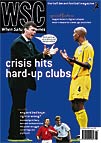 Shaul Adar reports on a team that has inspired hope and relief in a beleagured Israel
Shaul Adar reports on a team that has inspired hope and relief in a beleagured Israel
It has been an annus horribilis, for Israel in general and for Israeli football in particular. On one recent Saturday evening, during the broadcast of a live game from the local league, a suicide attack took place in an Orthodox part of Jerusalem. For 12 minutes the shocked viewers could see the game continuing on one third of the screen, while the other two thirds carried live pictures from the carnage scene.
Every weekend the Israeli national radio station replays a cluster of sound bites from the week. In the last year it has taken a familiar pattern – reports on Palestinian attacks, then those of the Israeli military, followed by a stern speech from Prime Minister Ariel Sharon. But then the tone changes with news of another amazing UEFA Cup victory for Hapoel Tel Aviv.
Like all Israeli teams Hapoel were founded as part of a political organisation. Hapoel means “the worker” and like most other teams with the same connection, they play in red and have a badge featuring a hammer and sickle (and a boxer). They represented the Labor Party and were financed by the main workers’ union. However, Hapoel became a symbol of the exploitation of football by the Labor Party during a period when most other teams (apart from Beitar Jerusalem of the nationalistic right) lost their political connotations. When Labor lost power in the 1970s and the union couldn’t afford to fund a football team any more, Hapoel plunged into poverty.
Help arrived five years ago when a private consortium bought the team. Since then, it seems that Hapoel can do no wrong. Their old symbols were downplayed, youth academies were developed, coach Dror Kashtan was awarded a long-term contract, and the players spent time taking English lessons and going to the theatre as well as training. Today, Hapoel Tel Aviv is as about as socialist as New Labour.
Their success in Europe has led to an identity crisis among fans and players. Hapoel fans hated the unwanted adulation from fans of Maccabi Tel Aviv and Beitar, who publicly thanked Hapoel for bringing pride back to Israel after the UEFA Cup victories over Chelsea, Lokomotiv Moscow and Parma, and the first leg win against Milan. Hapoel’s many friends in the media have made it clear they do not wish to become “the team of the nation”.
This jingoistic term is attached to everything popular in Israel and especially to the Maccabi Tel Aviv basketball team, one of Europe’s elite for the last 30 years. “I don’t want to be like Maccabi,” said Yossi Abuksis, the key Israeli midfielder in the Hapoel team. After the victory in the Moscow snow, it was Abukis who led the players in derogatory songs about a Maccabi basketball player.
At the Parma game, I met Israelis who haven’t been to football matches in years, fans of most other teams in Israel and even Beitar fans who had flown in from New York. They all sang “If you are not jumping you are yellow” – that being the colour of Maccabi Tel Aviv and Beitar Jerusalem. While Maccabi Tel Aviv fans used to conquer cities with all the charm and elegance of the Israeli army in the West Bank, Hapoel fans have been generally friendly and charming wherever they have gone, and have even stood politely in queues when asked.
Hapoel’s defensive tactics during the whole campaign were not pretty to watch, but the results were impressive. They only lost one game – in the San Siro in front of 9,000 Israeli fans (more than they get at most league games) – and that was all it took to galvanise a nation. “The coach told us not to fear because Israelis never fear,” said skipper Shimon Gershon after the Milan game.
In a time when many Israelis are afraid to leave their homes, this seems like a hollow sentiment. But it does sum up Hapoel Tel Aviv’s amazing season – a fantastic UEFA Cup run and an emotional bear hug from a society in crisis.
From WSC 183 May 2002. What was happening this month